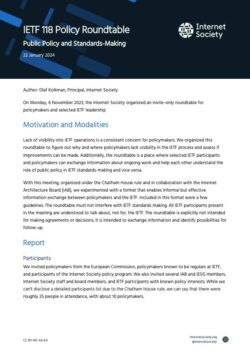Author: Olaf Kolkman, Principal
On Monday, 6 November 2023, the Internet Society organized an invite-only roundtable for policymakers and selected IETF leadership.
Motivation and Modalities
Lack of visibility into IETF operations is a consistent concern for policymakers. We organized this roundtable to figure out why and where policymakers lack visibility in the IETF process and assess if improvements can be made. Additionally, the roundtable is a place where selected IETF participants and policymakers can exchange information about ongoing work and help each other understand the role of public policy in IETF standards-making and vice versa.
With this meeting, organized under the Chatham House rule and in collaboration with the Internet Architecture Board (IAB), we experimented with a format that enables informal but effective information exchange between policymakers and the IETF. Included in this format were a few guidelines. The roundtable must not interfere with IETF standards making. All IETF participants present in the meeting are understood to talk about, not for, the IETF. The roundtable is explicitly not intended for making agreements or decisions. It is intended to exchange information and identify possibilities for follow-up.
Report
Participants
We invited policymakers from the European Commission, policymakers known to be regulars at IETF, and participants of the Internet Society policy program. We also invited several IAB and IESG members, Internet Society staff and board members, and IETF participants with known policy interests. While we can’t disclose a detailed list of participants due to the Chatham House rule, we can say that there were roughly 25 people in attendance, with about ten policymakers.
Discussion
Before the meeting, the participants received a curated list of activities at IETF that may be of policy interest. We discussed some of the working groups: MIMI because of its link with the Digital Markets Act; DULT because of its obvious physical safety implications; EBPF as an example of new communities using the IETF processes; SCITT because of its cybersecurity implications; and the role of the IRTF in bridging research and standardization, for instance through the policy-related work in research groups such as HRPC and RASPRG.
Some policymakers expressed that they see policy, security, and Internet governance issues across the whole spectrum of IETF work. When the work is underway, it is usually not the role of policymakers to engage in the design of the bits and bytes. It is important to understand the roles of the various actors if that understanding changes during the lifetime of a working group that may have policy implications.
We continued with a short discussion of a recent blog on standards and regulation that argues that standardization is private regulation. Some interesting questions were raised, e.g., how the IETF interacts with other regulators if we consider ourselves through the lens of being a regulator.
The third topic, EU standardization priorities, was discussed at greater length.
Two DGs deal with standardizations: DG Connect with Internet standards and DG Grow with standardization in general. In 2022, DG Grow published a standardization strategy for the Commission, mostly focused on regional standard organizations. The strategy mentions the IETF and raises a concern with the deployment of key Internet standards (IPv6, routing security, etc.). The group discussed deployment and deployment characteristics: the standards mentioned by the Commission have been around for a long time. In fact, their slow deployment made the IETF more conscious about deployment issues when developing standards today.
Next, we covered the tension between European and global standards-making and the risks of fragmentation. It was observed that the EU strategy’s focus on European standards-making by Europeans is contextual and does not necessarily apply to Internet standardization. The EU does see global standards as the foundation for a global Internet. It was clear that the EU’s goal is a global Internet standards-based architecture that is open and interoperable. However, on the content layer, the EU intends to regulate where needed.
We finally discussed how policymakers in general, interact with the IETF. Policymakers expressed a need for coordination across the IETF community of how policymakers can be a constructive part of the work. It is clear that there is a lifecycle aspect to that engagement—later in the working process when the bits and bytes of the protocols are discussed, policymaker involvement is often less significant than during the initial discussion and working group creation, where requirements and scope are set.
Conclusion
Because we observe a rising interest of policymakers in standards-making, the Internet Society organized this roundtable as an experiment on how to improve the visibility between policymakers and the IETF. While the substantive discussion was informative and may have clarified issues where there were misunderstandings, the greatest benefit of this meeting is its confidence-building nature.
Finally, we identified a number of challenges and improvements in organizing this event. First, inviting the right people or even knowing which policymakers will be present at a particular IETF meeting. Second, in order to set a substantive and relevant agenda for this event, capacity building, trust, and continuity are essential. However, all in all, we conclude that this iteration of the experiment was successful and plan to organize another roundtable at IETF 119.
